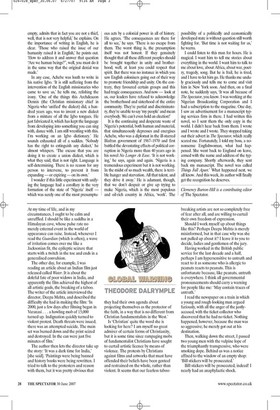Global Warning
At my time of life, and in my circumstances, I ought to be calm and unruffled. I should be like a saddhu in a Himalayan cave, whose pulse rate no merely external event in the world of appearance can raise. Instead, whenever I read the Guardian (which is often), a wave of irritation comes over me like a Jacksonian fit, the epileptic seizure that starts with a twitch in the toe and ends in a generalised convulsion.
The other day, for example, I was reading an article about an Indian film just released called Water. It is about the doleful fate of poor widows in India, and apparently the film achieved the highest of all artistic goals, the breaking of a taboo. The writer of the article interviewed the director, Deepa Mehta, and described the difficulty she had in making the film: 'In 2000, just a few days after filming began in Varanasi. . . a howling mob of 15,000 turned up. Indignation quickly turned to violent protest. Death threats were issued; there was an attempted suicide. The main set was burned down and the print seized and destroyed. In the can were just five minutes of film ' The author then lets the director take up the story: 'It was a dark time for India,' [she said]. 'Paintings were being banned and history books were being rewritten. I tried to talk to the protesters and reason with them, but it was pretty obvious that they had their own agenda about projecting themselves as the protector of the faith, in a way that is no different from Christian fundamentalists in the West.'
Is 'Christian' quite the word she is looking for here? I am myself no great admirer of certain forms of Christianity, but it is some time since rampaging mobs of fundamentalist Christians have sought to curtail artistic licence by means of violence. The protests by Christians against films and artworks that must have offended their beliefs have been genteel and restrained on the whole, rather than violent. It seems that our fearless taboobreaking artists are not so completely free of fear after all, and are willing to curtail their own freedom of expression.
Should I work myself up about things like this? Perhaps Deepa Mehta is merely misinformed, but in that case why was she not pulled up about it? I leave it to you to decide, ladies and gentlemen of the jury.
Having worked in the British public service for the last decade and a half, perhaps I am hypersensitive to untruth and react to it as someone who is allergic to peanuts reacts to peanuts. This is unfortunate because, like peanuts, untruth is everywhere. I think all governmental pronouncements should carry a warning for people like me: 'May contain traces of untruth.'
I read the newspaper on a train in which a young and rough-looking man argued furiously, with all the anger of the justlyaccused, with the ticket collector who discovered that he had no ticket. Nothing happened, however, because the man was so aggressive; he merely got out at his destination.
Then, walking down the street, I passed two young men with the vulpine lope of the triumphantly transgressive, who were smoking dope. Behind us was a notice affixed to the window of an empty shop: 'Bill stickers will be prosecuted.'
Bill stickers will be prosecuted, indeed! I nearly had an anaphylactic shock.


















































































 Previous page
Previous page